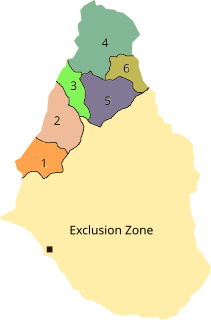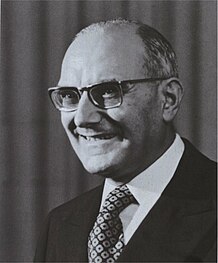
Politics of Bahrain takes place since 2002 in a framework of a constitutional monarchy where the government is appointed by the King of Bahrain, King Hamad bin Isa Al Khalifa. The head of the government since 1971 is Prime Minister Prince Khalifa bin Salman Al Khalifa and the Crown Prince is Prince Salman bin Hamad Al Khalifa, who serves as Commander of the Bahrain Defence Force. The parliament is a bi-cameral legislature, with the Chamber of Deputies elected by universal suffrage, and the Shura Council appointed directly by the king. MP Khalifa Al Dhahrani is the Speaker of Parliament.

James J. Bradley is a politician in Ontario, Canada. He was a long-serving Liberal member of the Legislative Assembly of Ontario, sitting as an MPP from 1977 until 2018. He represented the riding of St. Catharines and served in the provincial cabinets of David Peterson, Dalton McGuinty and Kathleen Wynne. He was elected as a regional councillor in the St. Catharines municipal election of 2018. He is currently the Chair of the Regional Municipality of Niagara.

The National Assembly is bicameral with the lower house, the Chamber of Deputies, having 40 members elected in single-seat constituencies for a four-year term. The upper house, the Shura Council, has 40 members appointed by the King of Bahrain, with the stated aim of giving a voice to minority communities and technocratic experts within the legislative process. Supporters of the system refer to long established democracies the United Kingdom and Canada operating with this bicameralism with an appointed upper chamber and an elected lower chamber. Opponents of this system point out that unlike the bicameral systems in the UK and Canada, the Bahraini system gives the unelected upper house equal or more legislative power than the elected lower house, allowing the King to control all legislation. Opponents also point out that the current system was imposed unilaterally by the King, violating the 1973 Constitution and a 2001 signed agreement with the Bahraini opposition.

Elections in Montserrat take place within the framework of a multi-party democracy and a parliamentary system. The Legislative Assembly is directly elected, and a Chief Minister is selected by the party or coalition with the most seats in the Assembly.

Peter John Law was a Welsh politician.

The House of Representatives is the lower house of the National Assembly of Thailand, the legislative branch of the Thai government. The system of government of Thailand is that of a constitutional monarchy and a parliamentary democracy. The system of the Thai legislative branch is modelled after the Westminster system. The House of Representatives has 500 members, all of which are democratically elected: 375 members were directly elected through single constituency elections, while the other 125 are elected through party-list proportional representation. The roles and powers of the House of Representatives were enshrined in the Constitution of 2017.

Sarbananda Sonowal is an Indian politician who has been Chief Minister of Assam since 2016.

The Prime Minister of Zimbabwe was a political office in the government of Zimbabwe that existed on two separate occasions. The first person to hold the position was Robert Mugabe from 1980 to 1987 following independence from the United Kingdom. He took office when Southern Rhodesia became the Republic of Zimbabwe on 18 April 1980. This position was abolished when the constitution was amended in 1987 and Mugabe became President of Zimbabwe, replacing Canaan Banana as the head of state while also remaining the head of government. The office of Prime Minister was restored in 2009 and held by Morgan Tsvangirai until the position was again abolished by the 2013 Constitution of Zimbabwe.
Naomi Namsi Shaban is a Kenyan politician. She was first elected to represent the Taveta Constituency in Parliament in 2002 through a Kenya African National Union (KANU) ticket. She defended the seat in 2007 election through KANU and won. Later she joined the National Alliance Party (TNA) and was re-elected to represent Taveta Constituency in the National Assembly of Kenya in 2013

Parliamentary elections were held in Portugal on 26 October 1969. The elections were announced on 12 August, and were the first under Prime Minister Marcelo Caetano, appointed in the previous year to replace long-term Prime Minister Antonio de Oliveira Salazar, who had been left incapacitated after a stroke. The quasi-sovereign National Union won all seats with an official turnout of 62.5%.
Tan Sri Dato' Seri Abdullah bin Md Zin was the Member of the Parliament of Malaysia for the Besut constituency in Terengganu from 2004 to 2013, sitting as a member of the United Malays National Organisation (UMNO) in Malaysia's ruling Barisan Nasional coalition.

Parliamentary elections were held in Lithuania on 8 October 2000. All 141 seats in the Seimas were up for election, 71 of them in single-seat constituencies based on first-past-the-post voting; the remaining 70, in a nationwide constituency based on proportional representation. Altogether, around 700 candidates competed in the single-seat constituencies, while over 1,100 candidates were included in the electoral lists for the nationwide constituency.

General elections were held in Bahrain for the first time on 12 December 1973. 30 seats out of the 44-seated unicameral National Assembly were contested, the other 14 were ex officio. Of the 24,883 registered voters, 19,509 cast a ballot, giving a voter turnout of 78.4%.

The first municipal council in Qatar was formed in the early 1950s and it was reorganized in 1956. Doha municipality came into being in May 1963. The Ministry of Municipal Affairs was established in 1972 as a government body responsible for supervising the functions of municipalities.

Legislative Council elections were held in Burma on 21 November 1922, the first in the country's history.
Mansour bin Mutaib Al Saud was the minister of municipal and rural affairs of Saudi Arabia and is a member of House of Saud. He is a minister of state.

General elections were held in Bahrain on 22 November 2014, with a second round on 29 November in constituencies where no candidate received at least 50% of the vote. The elections were boycotted by the Shiite Islamist opposition. The government announced the voter turnout as 52.6%, although the opposition claimed it was only 30%.

General elections were held in Oman for the first time in 1991.
Brigadier General (R) Tan Sri Dato' Seri Haji Abdul Hamid bin Ngah @ Zainal Abidin is the former Chairman of Majlis Amanah Rakyat from 16 July 2004 to 2009. He was a member of Parit Buntar Parliament and became Minister in the Prime Minister's Department.

Parliamentary elections were held in Portugal on 22 March 1840.

















